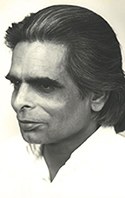To spread the original, universal and eternal truth, path or law of yoga, which remains forever the same in essence, yet always adapts to the time and place. |
|
So Shakti is the mother goddess, the source of all, the universal principle of energy, power or creativity. The worship of Shakti as this energy is the main objective of Tantra Yoga. Shakti is inseparable from the one who beholds her, the Shakti-man, the masculine principle or Universal father. Shakti-man is called Brahman by the writers of the Upanishads. In the Tantric tradition he is called Shiva.
The motivating force behind this eternal play that creates the illusionary world of phenomena is the power of desire. This desire is present in the one who is without attributes, the nameless and formless aspect of the divine. |
|
This introduction on Shakti was extracted from "Tools for Tantra", which contains many more details on the 10 Mahavidias or incarnations of the Divine Mother that are all described in the book, including their yantras. |
 Sanatan Society is an international networking association of students of the late Harish Johari, joining efforts to promote his teachings of yoga philosophy, tantra, worship, art and love. Sanatan Society stands
for the original, universal and eternal truth, path or law of yoga.
Though it is Hindu in origin, Sanatan Society is not limited to any religion,
race, time or country, nor in fact to any particular organisation. More about Sanatan Society...
Sanatan Society is an international networking association of students of the late Harish Johari, joining efforts to promote his teachings of yoga philosophy, tantra, worship, art and love. Sanatan Society stands
for the original, universal and eternal truth, path or law of yoga.
Though it is Hindu in origin, Sanatan Society is not limited to any religion,
race, time or country, nor in fact to any particular organisation. More about Sanatan Society...